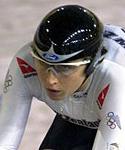
Recently on Cyclingnews.com |
Introduction to Track Racing - What's a Wheelrace? - Introduction to Six Day racing - UCI codes
An interview with Sarah Ulmer
Finding the recipe for success
After her record-breaking pursuit ride at the Commonwealth Games in Manchester, Sarah Ulmer was tipped to be an outside chance for the gold medal at this year's World Track Championships. She even went as far as to reduce her road racing schedule to a minimum, but come race day, things went off the boil. In the lead up to Athens, Anthony Tan speaks to the woman searching for the recipe to success.
WHEN I CALL SARAH ULMER FROM HER HOME IN CAMBRIDGE on New Zealand's North Island, she first asks me whether I mind if she prepares for a dinner party at the same time she to talks to me.
Not at all, I say to her. For a large portion of the male population (myself included), such a thought wouldn't even register on the psychological radar, yet for most women including Ulmer - a proven success on the track, on the road, and, apparently in the kitchen - it's all in a day's work.
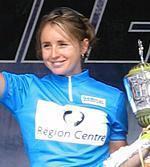 |
So with the World Track Championships over and the road season drawing to a close, how has the Commonwealth Games individual pursuit champion been spending her time on the bike?
"I haven't," hoots Ulmer in a typically thick Kiwi accent. Well, that was supposed to be my first attempt at a serious question...
"I've just had a good break off the bike since I got back from overseas (her last race was the Trophée d'Or stage race at the end of August, where she won three out of the six stages and finished sixth overall). Although I did try doing a fun-run on the weekend... which was pretty disastrous [more laughs]. I'll get back on the bike next week though, but not within any structured programme."
This might not sound like a formula for success, however in 2002, Ulmer had an incredible season. The 27 year-old started the year taking national titles in the individual pursuit and points race as well as the national criterium championship, continuing her good form later on at the second round of the Track World Cup (the only round she contested) in Sydney, where she recorded her fastest time at sea level. However, the crowning moment was her glorious gold at the Commonwealth Games in Manchester, where she smashed the Games record for the 3000 metre individual pursuit in a time of 3 minutes 32.467 seconds, averaging 50.828 km/h.
"I thought that was very impressive. Absolutely incredible... absolutely amazing."- Ulmer describing Katie Mactier's ride at this year's World Track Championships |
After that, Sarah Ulmer was ready to take on the world. So it was no surprise to see her reduce her road racing schedule that has often seen her competing on the US and European scene in between rounds of the Track World Cup. "Yeah, that's about right", she says, "it was more of a controlled road racing calendar, rather than doing lots of road racing for the sake of doing lots of road racing."
In what was becoming a formality, the year began well for Ulmer, repeating her national championship wins in the individual pursuit and points race in March before contesting the second round of the Track World Cup in Mexico later that month. In Aguascalientes, she qualified fastest and finished fastest by a whopping seven seconds, making Erin Mirabella from the USA and Lithuanian Rasa Mazeikyte look like a bunch of weekend warriors. By the fourth and final round of the World Cup in two months later, Ulmer was clocking her fastest times to date; a few seconds off her record-breaking time in Manchester but considerably quicker than her opposition, this time a convincing winner over another Lithuanian, Diana Ziliute and up-and-coming Aussie Amy Safe at Sydney's Dunc Gray Velodrome.
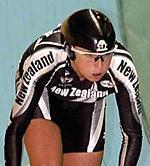 |
Despite her impressive winning streak, she wasn't letting success go to her head: "I think Manchester was one of the fastest [tracks] I've ridden on, so you have to keep in perspective things like venues, the event and your competition when analysing your performances," says a pragmatic Ulmer.
Which begs the question: with top riders like world record holder Zijlaard-Van Moorsel and Slusareva unable to compete due to commitments on the road or for reasons of cost, is lack of competition in endurance disciplines a problem at the World Cup?
I'm a little surprised Ulmer doesn't think so. "I don't think it's a problem in the pursuit. To be honest, no one expects to have four world championships at the World Cup events; I think for the purpose that the World Cup serves, the competition is good enough and I certainly keep that in perspective if I happen to win a round."
Irrespective of event or venue, with two national titles and two World Cup wins - as well as the overall series win - everything was coming together quite nicely. Returning home to NZ where she now spends one third of her year (Sarah tells me the rest is spent racing overseas, in a car, or on a plane), Ulmer opted for some R&R until mid-June before catching a flight to the States to race with the TDS Women's Cycling team, and afterwards to Pennsylvania for some local track racing.
As a part-time road racer, she certainly held her own. In her first stage race for the year, the Nature Valley Grand Prix, Ulmer rode consistently throughout the four-day event to finish fourth overall, outclassing riders from teams like T-Mobile and Diet Rite. Then less than two weeks later at the Fitchburg Longsjo Classic, she won the first two stages and took the lead before the might of Team Saturn stole her chances for overall victory, though still managing a very credible fifth. She also picked up a victory at the inaugural Quakertown Criterium, ahead of Saturn's Laura van Gilder. "I look back on my season and I had some good road results and some good track results, but obviously the main focus of the year was the World Track [Championships] in August," says Ulmer, her mind never wavering from the bigger picture as she recalls her thought process leading to Stuttgart. It appeared the Kiwi from Cambridge was on song for a great World's.
"I think it's hard for anyone to say they can do a sub-3'30 in Athens... I mean, they haven't even built the track yet!"- Ulmer on Leontien Zijlaard-Van Moorsel's comments made after the World Track Championships |
While it was no surprise to see race favourite Leontien Zijlaard-Van Moorsel qualify fastest in 3:32.002, there was a new kid on the block: Australian Katie Mactier, who qualified second-fastest by less than half a second.
"I thought that was very impressive. Absolutely incredible... absolutely amazing," says a Ulmer, sounding almost as gobsmacked as the day it happened. The 28 year-old Victorian only decided to contest the national titles a few months earlier when her working visa to the United States was initially denied, leaving Mactier stranded from her Saturn team-mates. Since winning the Australian pursuit title and her subsequent performance in Stuttgart, however, Mactier is now Athens-bound.
Other stuff
|
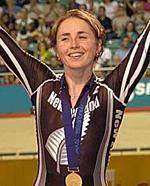 |
Mactier's qualifying result and first round success, combined with Zijlaard-Van Moorsel's unwavering consistency, bumped Ulmer into the bronze-medal playoff against Russian Olga Slusareva. Just two-tenths of a second separated Ulmer from Slusareva in qualifying, so the fight for the remaining podium place was expected to be a close one.
It wasn't to be. Olga upped the ante and rode a blistering 3 minutes 31.938 seconds against Ulmer's 3 minutes 33.661. "I wasn't really surprised; I knew she was capable of a fast time," says Ulmer. "She's been at the top of the rankings for years, but given it was her last run and her initial qualifying time, it was an impressive performance."
For someone who had spent most of the year focussed on one race, the result was an embarrassing one, though profoundly inexplicable. "I just wasn't good enough," she laughs, although very half-heartedly. "I raced 110 per cent, I had a good build-up, and as far as I was concerned, I thought my preparation was as good as last year... but I simply couldn't produce anything better than fourth on the day. Pretty straightforward, really."
But we both know track cycling isn't straightforward at all; to be at your best - mentally, physically, spiritually - for just one day is a rare occurrence; to plan for it and pull it off is even rarer.
It's interesting to note that had Ulmer been up against Zijlaard-Van Moorsel or Mactier in the pursuit finals at Stuttgart, her time at the Manchester Commonwealth Games would have won her a rainbow jersey. While both track differ in length, surely that's worth considering?
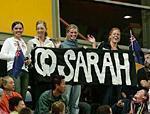 |
"For performance, yes, but tracks around the world - even if two may be indoor and board - can differ quite markedly in pace," she says. "But having said that, I still look at the training I've done this year and my times at different tracks and do my analysis from there."
Pressure may also be a factor Ulmer hasn't fully considered yet. For countries like Australia and New Zealand, a Commonwealth Games gold medal is a big deal, and Ulmer admits her profile has elevated several-fold since her achievements in Manchester last year. In fact, she is, by some margin, the most popular - and heavily endorsed - cycling identity in the country, having shot television commercials for past and present sponsors including Watties, Qantas, Nike and just recently, McDonalds, where Ulmer is co-organising a fun-ride with the restaurant (I use this term in the loosest possible sense) chain to promote a message of "eating smart and getting healthy".
"It's not something that I would choose, to have this much exposure, but this is the way my career has gone," she says, preferring to shy away from the reality of having a certain celebrity-status in her home country which far exceeds that of her male counterparts Gordon McCauley (Schoeder Iron) and Julian Dean from Team CSC. Ulmer adds that she has a fantastic manager who has fought long and hard for her sponsorship deals, who has achieved much more than what she could have done on her own, emphasising the importance of professional management of sport stars, particularly in non cycling-oriented countries.
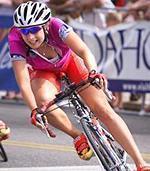 |
Soon after Katie Mactier sent an ominous warning to her competitors in Stuttgart for those daring to line up against her in Athens next year, recently-crowned hour record holder and Leontien Zijlaard-Van Moorsel said: "I know I have to do a 3'29 to beat her if she's in the same shape." So is Mactier the most serious threat, or is the Dutchwoman trying to divert some of the pressure away from her?
"Every single person that lines up is a threat," Ulmer says in a tone blunt enough that reveals her voraciously competitive nature. "If you're going to win it [the Olympic Games], you can't really look at one person being a threat, but rather the entire field, regardless of who you're racing."
Speaking about the possibility of going below the magical three minutes and 30 seconds barrier (Zijlaard-Van Moorsel's world record stands at 3'30.816), Ulmer's a little more cautious in her assessment: "My personal best is 3'32, and I know I'm definitely capable of going faster than that. But I think it's hard for anyone to say they can do a sub-3'30 in Athens... I mean, they haven't even built the track yet!" she laughs.
As the clanging of pots and pans becomes more audible, I believe I've been given a subtle hint to wrap up this interview. Ulmer may know tonight's recipe for culinary success like the back of her hand, but like race day in August next year, whether the result turns out to be a perfect one is still unknown.
See also: 2002 interview
with Sarah Ulmer, 2003 World Track
Championships
Other
Talking Cycling Interviews

